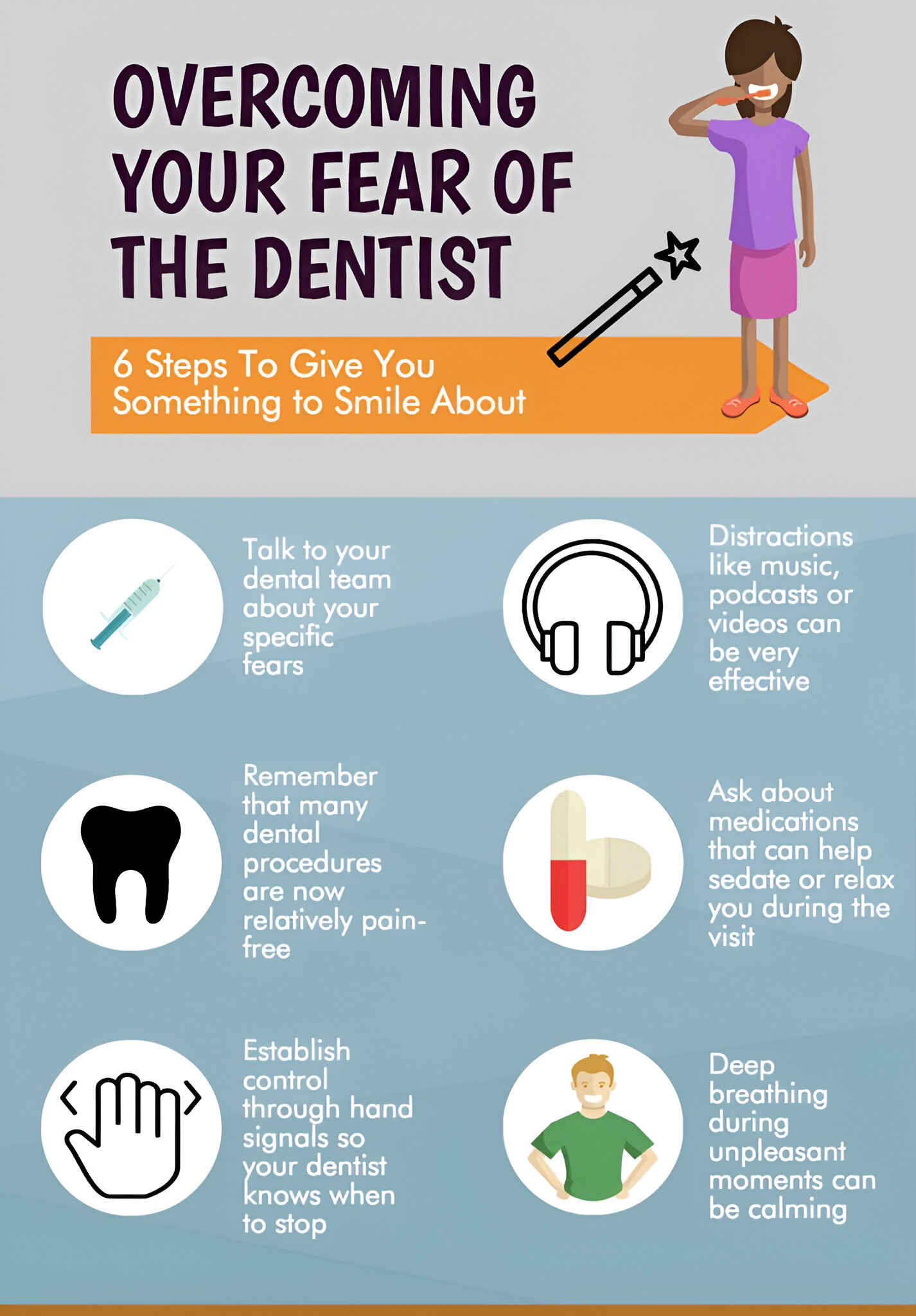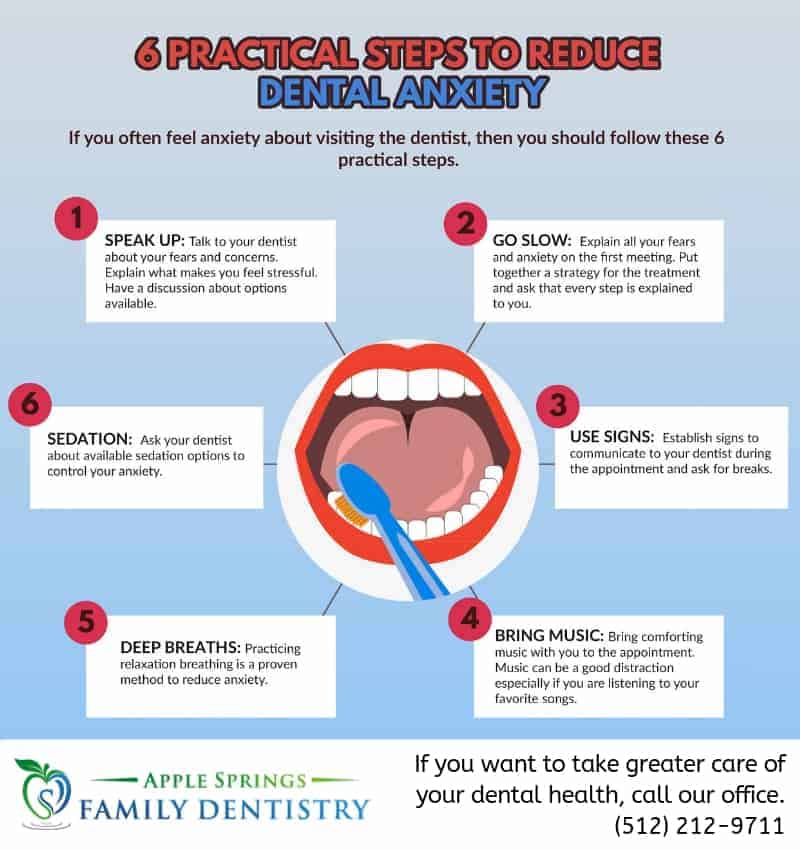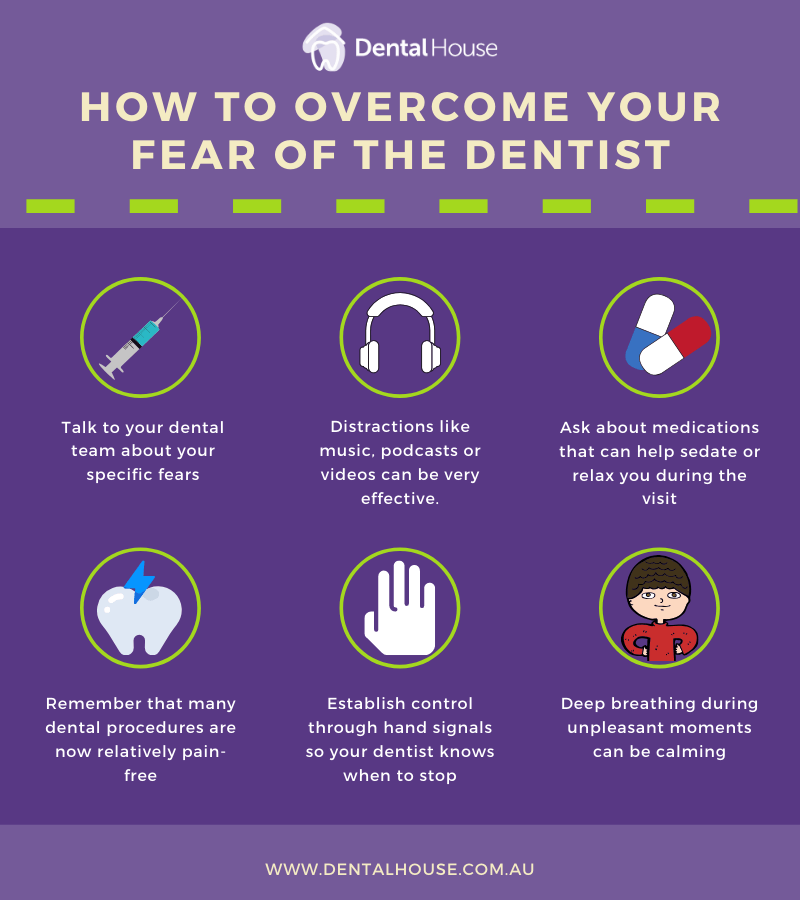Dental Anxiety: Overcoming Your Fears
Dental anxiety is a common condition that affects millions of people worldwide. The thought of visiting the dentist can bring feelings of nervousness, fear, and even dread. Whether it’s the sound of the drill, the thought of needles, or simply a past negative experience, dental anxiety can prevent people from seeking the oral care they need.
But there’s no need to let fear stand in the way of your oral health. In this article, we’ll explore what dental anxiety is, its causes, and most importantly, how to overcome your fears so that you can maintain a healthy, confident smile.

What Is Dental Anxiety?
Dental anxiety refers to the fear or apprehension a person experiences when thinking about or visiting the dentist. This fear can range from mild nervousness to full-blown panic attacks. For some individuals, the thought of sitting in the dentist’s chair can bring on physical symptoms such as sweating, heart palpitations, or even nausea.
While it’s perfectly normal to feel a bit anxious about a dental visit, dental anxiety goes beyond ordinary nerves. It can lead to the avoidance of necessary dental treatments, resulting in poor oral health and a greater risk of serious dental issues.
Symptoms of Dental Anxiety
Some common signs that you might be experiencing dental anxiety include:
- Rapid heart rate or palpitations
- Sweating, dizziness, or nausea
- Difficulty breathing
- Tense muscles or shaking
- Feeling faint or lightheaded
- Avoiding dental appointments altogether
If you’re experiencing these symptoms, it’s important to recognize them so that you can take steps to manage your anxiety effectively.
What Causes Dental Anxiety?
Understanding the root causes of dental anxiety is key to overcoming it. Several factors can contribute to a person’s fear of the dentist, including:
1. Past Negative Experiences
A bad experience at the dentist, especially during childhood, can leave a lasting impression. Whether it was a painful procedure or an unpleasant encounter with a dentist, these experiences can shape how you feel about dental visits in the future.
2. Fear of Pain or Discomfort
Many people fear that dental procedures will be painful. While modern dentistry has come a long way in reducing pain and discomfort, the fear still persists. This is particularly true for individuals who may have sensitive teeth or have experienced discomfort during past treatments.
3. Fear of Loss of Control
Sitting in a dental chair can make some people feel vulnerable, especially since they must remain still for extended periods. For those who feel anxious about losing control, this lack of autonomy can contribute to a sense of panic or unease.
4. Embarrassment About Oral Health
Some people avoid the dentist out of shame or embarrassment about the condition of their teeth or gums. Whether it’s due to neglect or genetic factors, individuals may feel self-conscious about their oral hygiene and fear judgment from the dentist.
5. The Sound and Smell of the Dental Office
For some individuals, the sound of dental instruments, the scent of chemicals, or even the sight of needles can trigger anxiety. These sensory associations can lead to fear or anxiety long before the appointment even begins.
How to Overcome Dental Anxiety
The good news is that dental anxiety can be managed and overcome with the right approach. Below are several strategies that can help you conquer your fears and make your dental visits more comfortable.
1. Communicate Your Fears with Your Dentist
One of the best ways to manage dental anxiety is to openly discuss your fears with your dentist. A caring dentist will take the time to listen to your concerns and make accommodations to ensure your comfort. They may explain each step of the procedure, offer breaks during treatment, or provide extra support to help you feel at ease.
2. Consider Sedation Dentistry
If your anxiety is particularly severe, sedation dentistry might be a great option. There are several types of sedation available to help you relax during your visit:
- Nitrous Oxide (Laughing Gas): A mild sedative that helps you feel calm and relaxed during the procedure. The effects wear off quickly once the gas is stopped.
- Oral Sedatives: Pills or liquids that help reduce anxiety. They typically take effect before your appointment and can leave you feeling drowsy or even asleep.
- IV Sedation: Administered through an intravenous line, this type of sedation is more potent and can put you into a deeply relaxed state.
Sedation dentistry allows you to undergo procedures without the intense fear or anxiety that typically accompanies them. Be sure to talk to your dentist about which sedation option is best for you.
3. Bring a Supportive Friend or Family Member
Sometimes, having a familiar face by your side can help alleviate feelings of anxiety. Bring a friend or family member with you to your appointment for emotional support. They can sit in the waiting room with you, hold your hand during the procedure, and help keep your mind off any discomfort or fear.
4. Practice Relaxation Techniques
Learning relaxation techniques such as deep breathing, progressive muscle relaxation, or guided imagery can help calm your nerves before and during the appointment. Deep breathing, in particular, is an effective way to reduce tension and bring focus away from the anxiety-provoking situation.
Steps for Deep Breathing:
- Sit or lie down in a comfortable position.
- Close your eyes and inhale deeply through your nose, allowing your lungs to fill with air.
- Hold your breath for a few seconds.
- Slowly exhale through your mouth, releasing any tension.
- Repeat this process until you feel more relaxed.
5. Listen to Music or Watch a Movie
Some dental offices offer entertainment options to help distract you during your visit. Listening to soothing music or watching a movie on a tablet or screen can take your mind off the procedure and reduce anxiety. Bringing your own headphones and music playlist is also a good option if the office doesn’t provide entertainment.
6. Start with a Simple Visit
If you’re particularly anxious about a dental procedure, start by scheduling a simple check-up or cleaning. This allows you to get comfortable with the environment and build trust with your dentist. As you feel more at ease, you can gradually move on to more involved treatments.

FAQs about Dental Anxiety
Q1: Is dental anxiety common?
A1: Yes, dental anxiety is incredibly common. According to the American Dental Association, approximately 36% of people experience some level of fear or anxiety about visiting the dentist. For many, the fear is mild, but for others, it can be severe enough to avoid necessary dental care altogether.
Q2: Can I get sedated for a routine cleaning?
A2: Yes, sedation is available for routine cleanings and check-ups if you have severe dental anxiety. However, most people find these types of procedures are manageable without sedation. Be sure to discuss your options with your dentist ahead of time.
Q3: How do I know if I need sedation dentistry?
A3: If your anxiety is overwhelming and prevents you from receiving dental care, sedation dentistry may be appropriate. Talk to your dentist about your level of anxiety to determine if sedation is right for you.
Q4: How long does sedation dentistry last?
A4: The length of time sedation lasts depends on the type of sedation used. Nitrous oxide wears off quickly, while oral sedatives or IV sedation can last a few hours after the procedure.
Q5: Will my dentist judge me for my dental anxiety?
A5: No, a caring dentist will never judge you for feeling anxious about dental treatments. In fact, most dentists are very understanding and will work with you to ensure your comfort and make your visit as stress-free as possible.
Conclusion
Dental anxiety is a common but manageable condition. By communicating openly with your dentist, considering sedation options, and practicing relaxation techniques, you can overcome your fears and take control of your dental health. Remember, regular dental visits are key to maintaining a healthy smile, and with the right strategies, you can ensure that fear no longer stands in your way.
For more information on managing dental anxiety or to schedule an appointment with a compassionate dentist, visit Dental House.


